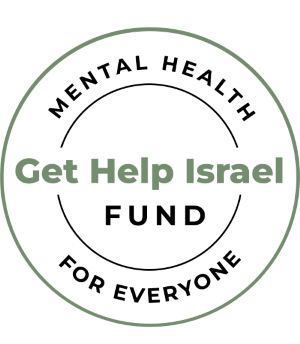Israel Wartime Anxiety: 3 Emotion-Focused Therapy Tips
.png)
These "tips" may seem different than what you had in mind.
We have all been obsessing over the news in the past few months and holding our breaths every time Dover Tzahal comes out with a new announcement about fallen soldiers or the hostages%27 status.
But maybe you took it a step further. Maybe you%27re eating much less, or on the contrary - eating a lot more?
Or maybe your mind still ruminates about some awful images you saw, or maybe it%27s "just" about the endless trail of grief that keeps seeping in from the media?
Perhaps this is all eating away at your ability to function at home or work.
You are, of course, not alone. You and I are part of a nationwide ongoing trauma, but that notion is simply not enough to navigate the daily stress.
You may have come across various "coping strategies" in the past, such as taking a break, breathing and mindfulness techniques, going on a run, or other behavioral methods. These are all great and can be very helpful in regulating and reducing high levels of stress when it becomes unbearable. I use them too, with myself and with my clients.
However, in the long run, it seems we need more fundamental help - help that takes our emotions and deeper needs into account, which is why I want to propose the following 3 important principles taken from Emotion-Focused Therapy (EFT), to practice and implement in your daily routine. EFT is a cutting-edge, evidence-based model with a long clinical tradition.
Here are the principles:
1. Turn towards your emotion, not away from it. It holds vital information.
Many times we hear about the need to control or harness our emotions, and society respects and rewards people who can restrict their emotions and be "cool" or rational.
Women may be given more of a break by society when they express softer emotions, but many times they too feel compelled to block and ignore them.
There are even some therapeutic approaches that encourage this.
Now don%27t get me wrong. Certainly, there are situations where it is not appropriate for us to express vulnerable or soft emotions.
Some clear examples include a soldier on the battlefield, a surgeon in operation, a lawyer in the courtroom, a chef during service time, or many other work-related situations. These usually call for what we would consider a "composed" emotional posture. A lawyer breaking down in tears in the courtroom will probably not be hired again.
But how about when you are at home, off-duty, or just taking a lunch break? If you are feeling high levels of anxiety, this emotion needs to be tended to at some point; not only when it turns into a panic attack.
And let%27s say you are having a panic attack:
Then by all means use those coping strategies. Do deep breathing, imagine your safe place, use the pressure ball, and recite mantras and affirmations to calm down. but once you calm down and your anxiety is more tolerable, take the time to notice the anxiety and focus on it. Please don%27t simply "move on" because then it%27s just a question of time before it balloons again into another panic attack.
So how does focusing on emotion help?
Your emotion holds important information about your deepest psychological needs. We don%27t want to neglect those needs. So how do we know what those needs are?
You first need to diagnose the anxiety, which leads me to the next point:
2. Is the anxiety primary or secondary?
This question is rooted in EFT theory. Suffice it to say that our emotions come in different shapes and forms. Two such categories are "primary" emotions and "secondary" emotions.
Primary emotions are triggered directly in response to an event. Secondary emotions are triggered in response to a primary emotion, or in response to a thought. That%27s why they%27re called "secondary". Because they are not the initial reaction.
I%27ll give you an example.
Anxiety as a primary emotion:
Say you are a graduate student and you are informed about a big test coming up. You react with anxiety, which makes sense. This anxiety is a direct reaction to a future event and therefore it is a primary emotion.
Or, on a vastly different note, if your spouse happens to be a soldier, it makes sense that you may react directly with anxiety about the possible future threat to him and to your family, which is very real.
Anxiety as a secondary emotion:
Going back to the first example, let%27s say you are a student and soon have a test, and you%27re feeling anxious. But most of your anxiety is not directly related to the test. Maybe the upcoming test triggers memories of past tests and failures, and maybe that dredges up more memories of being criticized by your parents for your grades.
So now, the primary or direct emotion being triggered by the upcoming test, is not just anxiety. Rather, the test mostly triggers old emotions of feeling incompetent, devalued, unappreciated, or even humiliated. In a nutshell - shame. But the shame is too painful and overwhelming.
So anxiety kicks in instead, as a reaction to the shame. As a way to avoid it. As a way to protect us from pain. Therefore, shame is the primary reaction to the test (and the old memories of past tests). The anxiety is secondary.
All of this happens within milliseconds, many times out of our awareness.
But if we can focus inwardly, we can try and notice more. Here are a few examples of questions to help diagnose the anxiety:
- "What is happening to me now?"
- "Am I anxious only because of this specific test?"
- "What other images are crossing my mind?"
- "Is this a familiar feeling? Does it remind me of anything in the past?"
- "What has my experience of tests been like in the past?"
These questions can help us expand and make room for our emotions. They can also help us make sense of them.
"Oh, I%27m feeling anxious because of the test, but also because as a child my mother would call me dumb and lazy whenever I would get less than a 90, and her words in my mind are feeding the pit in my stomach right now".
OK, now that we have a better awareness and understanding of our emotions. What%27s next?
3. Express unmet needs!
Our emotions hold vital information about what we want and need at any given moment. Therefore, once we have an elaborate experience of our anxiety and notice if any more painful emotions are "hiding" behind it, we have a better roadmap towards our unmet needs.
If my anxiety is a primary and a direct result of the test:
What is it telling me that I need?
To be alert and prepared for the upcoming "threat"!
Therefore, this anxiety is actually productive because it organizes me to prepare for the test.
So yes, it makes sense to be somewhat anxious before a test. It will push me to prepare and succeed! This is anxiety that we want to embrace and accept.
BUT, what if my anxiety is just a secondary reaction? (in many cases, it is a secondary emotion)
Then the only function it has is to avoid a more painful emotion. And then we need to focus inwardly and search beyond the anxiety. We need to "follow the yellow brick road" to our vulnerable pain and articulate the unmet needs of THAT emotion.
Let%27s assume the primary emotion underneath the anxiety is a type of shame (e.g. "I am incompetent", "I%27m not good enough", "I%27m a failure", "I%27m afraid of being a failure", "I%27m a crap person").
So what do you think I want or need?
To feel competent, worthy, appreciated, and acceptable, of course!
Or here%27s another pretty frequent one:
Say my primary emotion underneath the anxiety is fear of being alone (anxiety and fear are not the same thing!). Because, maybe when I got low grades on tests, rather than insulting me, my mother would turn away from me or hold back affection and love.
So now when the test is coming, I might say to myself - "I will be isolated/abandoned/disconnected/unloved".
OK, what would be my unmet need?
You got it - to feel close, connected, belonging, or loved!
These needs are extremely important for all of us. They are fundamental human needs. Accepting them, elaborating, and expressing them can be extremely healing.
And then, guess what? You don%27t need the anxiety to avoid the pain anymore. In other words, the more we turn towards the pain and express unmet needs rather than avoiding them, the less anxious we will be.
This is not always so easy and we may block ourselves from accepting and expressing these emotions and needs.
To sum up: When we feel extremely anxious about the war or the current situation, we first need to calm down and regulate ourselves with whatever coping skills we have. We actually need to feel less aroused by anxiety.
However, in the long run, it would be extremely beneficial for us to:
1. Turn towards our anxiety and feel it. It holds vital information about our needs.
2. Diagnose whether our anxiety is primary (direct reaction to an event) or secondary (reaction to more painful emotions that I%27m avoiding) and elaborate the feeling.
3. Express any unmet needs which are signaled by the emotion. Primary anxiety holds the need to become alert and prepared. Primary shame signals the need to feel worthy/appreciated/competent/acceptable. Primary fear of being alone signals the need for connection/love/belonging.
Tending to our emotions is ongoing work and you can try to do it alone or with a therapist. Don%27t give up!
Wishing you and us all more serenity and Besorot Tovot,
Daniel




